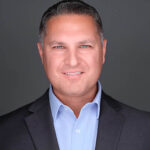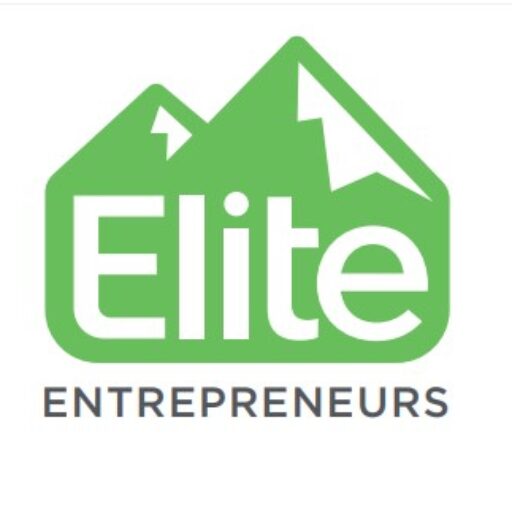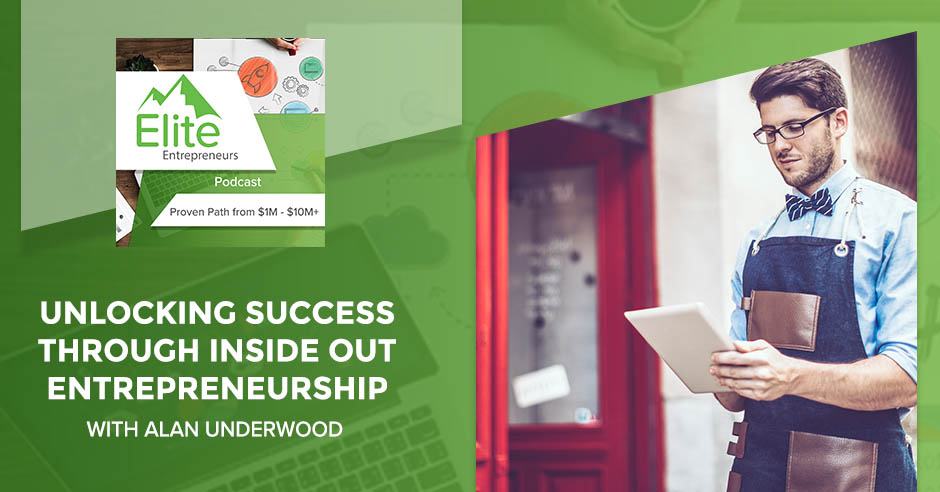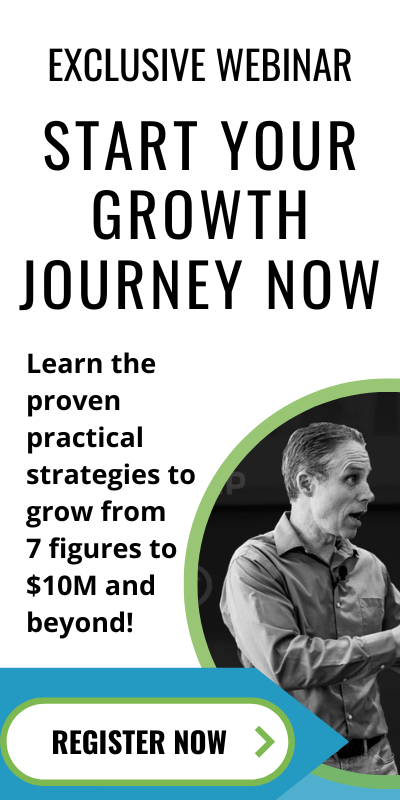Episode 152: Unlocking Success Through Inside Out Entrepreneurship With Alan Underwood
Entrepreneurs often overwork themselves to the point of burnout, thinking that it is the only path toward career and financial success. Alan Underwood learned this the hard way, but the fruits of adapting inside out entrepreneurship are indeed worthwhile. He joins Brett Gilliland to talk about the power of building success from within and the most important lessons he gained from creating several startups.
What the podcast will teach you:
- The nonprofit efforts of Angel Flight West
- The for-profit efforts of Momentum Capital Group
- What the transition from owner-operator to team builder looks like
- The hardship of losing three parents in two years
- The importance of letting kids experience mistakes
- The benefits of work delegation
Resources:
- https://www.angelflightwest.org/
- https://growwithelite.com/
- https://www.facebook.com/alan.underwood.54
- www.linkedin.com/in/the-alan-underwood
—
Watch the episode here
Listen to the podcast here
Every episode, I have the distinct pleasure of interviewing a guest who has been there and done that to some extent. Our guest now has been there and done that when it comes to growing multiple businesses past that $1 million mark and into multiple 7 figures, even 8 figures with some of these businesses, and I’m thrilled to have him here. Welcome to the show, Alan. We are glad to have you here.
I’m excited to do this with you. This is going to be fun.
Let me go ahead and give you a little bit more of a formal introduction here before we jump into the interview. Alan Underwood is from Momentum Capital Group, and we can talk more about that. He’s also heavily involved in some charitable work with an organization called Angel Flight West, which I’m also excited to talk about.
Before we get to those, let me talk about some of Alan’s past. Alan is a passionate pilot, entrepreneur, real estate developer, and investor. He loves public speaking and using his voice for good to make a difference in the lives of others. He’s had success. He’s built a reputation for launching and scaling successful businesses in a variety of industries including restaurant, automotive, insurance, aviation, and real estate. He has done this across multiple types of industries and multiple types of business models, and he has done it successfully. I’m grateful to have him here.
At 22 years old, he started his first business, a pizza restaurant chain with no prior business or restaurant experience. He grew the chain to multiple locations and eventually sold the restaurants to pursue other opportunities. He then went on to the car dealership, which he grew to over $16 million in revenue. Now he’s a full-time real estate developer and investor and gets involved with this Angel Flight West that we will talk about.
Alan, what you have done in your life is very impressive. You started young like many entrepreneurs do. You are one of these serial entrepreneurs who keeps doing new and cool things. Why don’t you give us a little bit of an insight into your main projects now whether it’s the Momentum Capital Group and Angel Flight West or whatever else you want to highlight? I’d love to hear from you what you are working on now.
I want to lead that with Angel Flight West because I believe at my core that the more that we give, the more that we get in return. Angel Flight West is a way for me to use something that I love. I’m passionate about aviation, something that I feel has saved my life in a very meaningful way to give back to others. Angel Flight West is a 501(c)(3) nonprofit that started several years ago.
We have about 2,000 volunteer pilots and these are guys like me who use their aircraft and they donate their time. They pay the entire cost of the flight to help people in need get to medical care that’s far from their home. That can be like a four-hour drive from Yuma to Phoenix. It’s a common flight that we do or it can be something much longer. We fly out to 1,000 miles away.
It’s across many different needs. Our primary mission is non-emergency medical transplant patients, cancer treatment, burn victims, and survivors, but we also fly for victims of domestic violence and abuse. We can help them get away from that situation. We fly in support of other charities, so we do blood and tissue donation flights. We do flights with active-duty military personnel and with veterans.
It’s a wonderful organization. One of the things I love about it is we have an operating budget of about $2 million and we raised funds for that. For example, our pilots donated in lifetime donations over $8 million. We are the only charity that can come to you and say, “Great news. If you donate $100, we will multiply that 4 times in the giving that we provide.”
That’s pretty cool and having you talk about it, I see this in my mind, this Army of volunteer pilots who are giving of their time and means to help these people in need. That’s remarkable. I appreciate you mentioning that. You spend a fair amount of time and energy on that or at least you have a lot of passion around that project. Talk to us about your for-profit efforts with Momentum Capital Group.
Momentum Capital Group is the direct product of a mastermind. I joined a mastermind group and, in that mastermind, met my now partner. His name is Christian. He had been a broker in San Diego for several years and had created wealth for himself by buying single-family homes and building an additional unit on the back of that property. In his case, he’s holding them.
What happens in that very basic model is you are going to buy a house for about $1 million. You will spend about $400,000 on that ADU. That property in this market at the minimum is going to sell for $2.1 million to $2.2 million. In 12 to 18 months, we can create $700,000 to $800,000 in equity. Now we are taking that opportunity to investors. Our goal over the next few years is $50 million in capital raise, and our projections for accredited investors are 35% to 42% return on that money in 12 to 18 months.
It’s a cool opportunity. I wish I had millions of dollars sitting around to help with that. That’s a cool project you are working on now, but you have owned, grown, and exited several businesses. While this show doesn’t focus on the exit element, it assumes most of the time that you have had some growth or you have had some success in that business.
I’d like to talk about some of the lessons you have learned as you have gotten to that point where you have made the transition from owner-operator, very heavily involved in the day-to-day to building the team and scaling the business to higher levels of impact and growth. We dig in on some of the things that you learned in that journey over multiple times as you have built several businesses.
We don’t have to start anywhere in particular. I’d rather not go back to pure startup mode. I’d like to get to the place where this thing was working. It’s off the ground. It’s 8 or 10 people maybe, and then some of the lessons that you learned to get through some of the common sticking points in scaling a business like that. Pick your favorite business. Which one do you want to talk about?
That’s a very interesting question to start on because I feel like that was my biggest weakness was that transition from startup and you are doing everything yourself to bringing in other people and allowing them to help with that. The most difficult step beyond that, which I feel like I’m still learning how to do, would be allowing them to do it while you envision bigger projects and growth differently.

Inside Out Entrepreneurship: The biggest weakness in entrepreneurship is doing everything yourself. Learn how to allow other people to do the work while you envision bigger projects and grow differently.
I feel like I’m in the middle of that right now, especially with Momentum. A great example of that is with our pizza restaurants especially there’s a limit to the number of hours and the amount of work that you can do. I didn’t know that at 22 years old. I thought that it was normal to show up at 4:00 in the morning and then not leave until 11:00 that night.
That was a lot of fun while my wife was doing that with me. As soon as we started having kids and all of a sudden, she wasn’t there, that’s when I realized, “This isn’t that much fun to be here and I need to put systems in place to where I can manage these and have a life outside of the business so that I’m not the business.”
That was the beginning of developing systems down to the fact that I needed to know that if I walked into one of our restaurants at any time, I could walk through the dining room and do exactly what state of management we were experiencing because the red pepper and parmesan cheese shakers were supposed to be on one side of the napkin dispenser and the salt and pepper on the order, and they are supposed to be in the middle of the table. Very quickly by walking in, if that stuff wasn’t that way, I knew that we had bigger problems.
That, for me, is where you have to start you have to observe your business from the outside if you were walking through or if maybe you were peering in with binoculars or something, you could look around and tell very quickly what was going on. That gave me an idea of how people were performing. We had some success with that with some managers and with others. We probably allowed them to stay longer than we should have, and they never could quite grasp some of those systems.

Inside Out Entrepreneurship: Observe your business from the outside. This will tell you what is actually going on and give you an idea of how people are performing.
I feel what I have learned now is that time I started building those systems after we were already up and running and things were going with Momentum Capital, it’s the complete opposite of that where I feel like we did spend months looking at those things before we brought the product out to other people to experience, because I didn’t want to have to build it after we were already running.
You probably had a little bit of perspective and maybe some time and financial patience to be able to develop those beforehand this time versus building the thing while it’s flying early on, so a lot of us experience that feeling of being stretched thin. You described 4:00 AM to 11:00 PM. That’s crazy. The restaurant business boggles my mind to begin with. There’s a new level of respect for me on the amount of work and presence that requires. At least what I perceive it requires, it’s a lot and that’s with one location. How many locations did you end up having in that pizza business?
In five years, we went from our very first one to having four locations that we owned completely and then a partnership in one other location. We had five locations in total. It was a challenge and I would love to say that I learned that lesson so well that I didn’t have to learn it again. I was taught from a young age and maybe a lot of other people are too, but my dad and my grandpa both taught me that the way to succeed in life was to show up early, stay late, and work harder than everybody else. I believed that was the recipe for success, and so that’s what I did.
I showed up early, I stayed late, and I felt like I outworked everyone else carried over into the car dealerships. That is a contributing reason why I still don’t have them now because I burned out. It wasn’t overworking. Beginning in 2016, my youngest daughter was born with a serious birth defect. She spent multiple months in the NICU on the edge of life and death.
When she came out of the hospital, she didn’t sleep through the night for more than a year. She’d sleep 1 hour or 2 hours at a time. We were extremely sleep-deprived. In 2018, we found out that my mother-in-law had cancer, and a week later, she passed away. 13 months after that, we lost my father-in-law to cancer, and 13 months after that, we lost my dad to a massive stroke.
In the period from 2018 to 2020, we lost 3 parents in 2 years. Under normal operating circumstances, I worked all the hours, showing up early, staying late, and outworking everyone who could work. It worked for me. When life shifts and now all of a sudden, you are hit with emotional challenges and mental challenges as a result of grief, trauma, and everything else that comes along with those experiences, then you recognize where your weaknesses were.
When life suddenly shifts and hits you with emotional and mental challenges as a result of grief and trauma, you recognize where your weaknesses are. Share on XI recognized pretty quickly that I couldn’t handle doing it anymore, and so we ended up selling. There’s a phrase that I have learned and it came to me when I started the dealership. I was working for a car dealer at the time and I let them know I was going to leave to open my place. One of the owners of that dealership sat down in front of me and said, “I want you to know that you are making the worst mistake of your life.” I looked back and I said, “I want you to know that one of us is.”
You could say that he was right. That was the beginning of 2007 right before the market crashed. I went from making $150,000 to $200,000 a year as a 26-year-old dealership manager to the next year as an owner being $40,000 more in debt and at the end of the year bringing $7,000. We figured out how to make it work, and that worst decision became the best decision I’d ever made up until that business point.
The same thing happened at the other end because I hadn’t learned delegation to the degree that I needed to. Too many of the processes ran through me. When I didn’t work, the business didn’t work as well and the option that I took was to sell it. You could look at that and say that was the worst decision of my life because I could still have a thriving business.
That forced growth in different areas that I never anticipated and has opened up opportunities now where I told my partner, Christian, I said, “Do you realize that I have been doing business for more than twenty years?” Until this point, the jewel on my cap was that I built that car dealership over 13 years from startup to $16 million a year. What we are doing now is building a business that’s 10 to 15 times that size in a quarter of the time. That wouldn’t be possible without some major internal work and growth on my part and relying on the partnerships that we have in place to carry their part of that load.
Thank you for sharing all of that. That sounds like you and your family went through quite a series of experiences from 2018 to 2020. We then go into pandemic mode right after that. It’s interesting how life can throw those curve balls. You are right about hard work. If I were you, I’d be thanking my dad and my grandfather for instilling in me that work ethic.
I would also want to pile onto that and say, “Let’s bring that level of work ethic,” and then let’s figure out how to build a team so that it doesn’t all thrive or fail based on what we can do and make happen as the superhuman entrepreneur because when you have to step out, you have to step out. You had several moments of needing to step away from the business and give your family more time and energy. It sounds like your business hurt those times that you had to step away. Hurt some and we can build it in ways that we don’t have to be so integral to making it all happen. It sounds like you have learned some great lessons. Thank you for sharing those.
We learn our best lessons often through the most difficult challenges that we face. It’s easy with kids, especially not to want to allow them to face those difficult things. I had a conversation with my wife on our morning walk about some of the things that our kids are facing. I said, “The biggest expectation is going to be that we are in a position that we can make it easy. If we do that, then they don’t get to where we want them to be.”
They miss out on the learning opportunity and we miss out on parenting differently. It’s the same as business. You have to be able to step out and let people have experiences. You have to let sometimes employees fail to a certain degree so that they can learn and grow through that. Those are difficult lessons to learn and it’s difficult not to be in control when some of the things are happening.
You and I have some things in common when it comes to parenting large families. I saw a picture of your family and was like, “Alan gets what it’s like to have a large family.” We have done a lot of parenting and coaching types of things to improve our parenting. Like in business, we need coaches and mentors.
One of the concepts I learned a long time ago that relates to what you were saying is more framed this way. Let the kids experience or make mistakes when the overall cost is still relatively low. Imagine them going 3, 4, or 5 years down the road and the financial, emotional, and relationship costs increasing dramatically as they get older. Let them learn those lessons when they are young and the cost is relatively inexpensive.
In our businesses, we have to figure out how we let people make mistakes. We are so consumed sometimes as business owners with preserving a customer experience or a standard of excellence, and those things ought to be preserved. We have to figure out how to let people make mistakes, and experience things, especially while those costs are relatively low. The longer we wait to let them experience that, the more expensive it gets in lots of facets. That reminded me of what you were talking about.
Education is expensive no matter how you get it.
I want to get one more practical thing out of your experience before we need to wrap up. With two of these businesses, you were quite young. What was key to your development as a leader? You mentioned the term delegation a couple of times. What did you have to go through to be able to finally give something to someone else in terms of delegation?
I don’t know that I have ever thought much about that question. Looking at where I am right now, I would say that when I was young, the objective of life and business was, “What can I get?” I can remember being 19 years old and telling a friend by the time I was 40, which at the time I thought was old. Forty is a long way away. I’m going to be a millionaire by the time I’m 40.
I got there and realized, number one, it wasn’t what I expected. I didn’t all of a sudden have $1 million worth and wake up, and it was a lack of luxury. I was still doing everything that I was doing the day before. My life hadn’t changed very much. It wasn’t until after experiencing grief, depression, and everything that came at the end of 2020 that I had to go, find myself, and realize that the greatest success and joy that I can experience is going to come in giving.
That can be in giving experiences or giving responsibility. In the charity that I do, it’s giving hope and helping people find healing. In the business realm, especially as we have gained experience, as we have grown, the greatest gift that we can give is to look for those who are around us, give them opportunities, and give them responsibilities attached to those opportunities.
Give them also the most important thing which is love, which you can define as coaching. You can define that as teaching. Love takes a lot of different forms, but at the end of the day, I believe that that’s what everybody is looking for. People will be more attracted to you to the degree that you love yourself and you love others. That will lead to success in life, business, your family, and everything else.
The greatest lesson that I have learned over the last couple of years was how to love myself so that I had enough love that I could give to others. If you love the people that you are working with to the degree that you want them to be more successful than you are, which is how I feel about my partners right now, I would love nothing more than to see them. They are both quite a bit younger than I am. Christian is 27 and Steven is late 30s. For me to be able to give some of the lessons I have learned so that they can climb to higher heights, it’s so motivating and enjoyable for me.
Providing flights to those who need it to lifting other people through your genuine care or love as you describe it is something just above what most of us deal with every day on a transactional level in our businesses. You are onto something that I believe is the thing in our leadership that we genuinely care about.
We went so far as to create a leadership model that we share with our community of seven-figure business owners, and it’s got things that you would expect like, “Here are the three things they need to do. Set the vision, build the team, get the resources, and don’t run out of cash.” Those are the responsibilities of a leader.
We are right in the middle. We drew this little heart and we wrote care. If you do those things from a place of love and genuine care, you are not going to have a hard time getting people and you are going to have a lot of fun lifting and developing them, and the business is going to do well. I couldn’t agree more. Thank you for that insight. It was awesome.
Thank you. I love that you have put the heart right in the middle of your coaching and teaching models. What a gift to your community.
I was doing a me too on that. I was doing a plus one on what you shared. I couldn’t agree more. It’s been a sincere pleasure. If people want to learn more about your charity work or get involved with your Momentum Capital Group, how would they connect with you or one of these wonderful things that you are working on?
Angel Flight West is easy. It’s AngelFlightWest.org. That’s if you are a pilot and you want to volunteer. If you are not a pilot, you want to volunteer or donate, or if you know somebody who’s traveling a great distance, or a loved one who’s traveling to be with that person, AngelFlightWest.org is where you can find us. If you connect with me on social media, it’s Alan Underwood on LinkedIn. You can message me there and I can help provide information on that charity.
Our capital group if you are investing or if you are curious about real estate and what we have going on, that’s MMTMGRP.com, and you can schedule a call with me. That’s how you can find me and I love nothing more than getting on the phone with people and seeing how I can help move them from where they are to the next great place in their life.
If you are reading, please like, share, and do all those things to make sure that this show gets in front of as many seven-figure business owners as possible. Every episode we have great guests like Alan who are sharing their actual insights from real experience. This doesn’t get any better. We will see you next time. Thanks for reading and keep growing.
Important Links
- Momentum Capital Group
- Angel Flight West
- Alan Underwood – LinkedIn
- MMTMGRP.com
- https://www.Facebook.com/alan.underwood.54
About Alan Underwood
 Alan is a passionate pilot, entrepreneur, real estate developer, and investor. He loves public speaking and using his voice for good to make a difference in the lives of others. Throughout his career, Alan has built a reputation for launching and scaling successful businesses in a variety of industries, including restaurants, automotive, insurance, aviation, and real estate. However, what truly motivates him is giving back to his community and making a positive impact in the world.
Alan is a passionate pilot, entrepreneur, real estate developer, and investor. He loves public speaking and using his voice for good to make a difference in the lives of others. Throughout his career, Alan has built a reputation for launching and scaling successful businesses in a variety of industries, including restaurants, automotive, insurance, aviation, and real estate. However, what truly motivates him is giving back to his community and making a positive impact in the world.
One of Alan’s most rewarding endeavors has been his involvement with Angel Flight West. As a Command Pilot and Arizona Outreach Coordinator, he has had the opportunity to use his love of flying to provide free air transportation to patients and their families who require specialized medical treatment far from home. As an Outreach Coordinator, he helps identify patients who can benefit from Angel Flight West’s services, establishes relationships with medical professionals, and connects patients with the transportation they need. Alan’s passion for entrepreneurship and helping others started at a young age.
At just 22 years old, he started his first business – a pizza restaurant chain – with no prior business or restaurant experience. He grew the chain to multiple locations and eventually sold the restaurants to pursue other opportunities. His next venture was a car dealership, which he grew to generate over $16 million in annual revenue.
Now, Alan is a full-time real estate developer and investor. He is currently developing a 91-unit apartment complex from the ground up and has bought and sold several millions of dollars’ worth of real estate. He is inviting investors to participate with him in development projects in San Diego where they can realize returns of more than 35% on their investments and build momentum towards financial freedom!
As an entrepreneur and investor, Alan understands how to help people, businesses, and capital grow. He is passionate about finding creative solutions to complex problems, and he believes that with hard work and determination, anything is possible. Whether it’s through his work with Angel Flight West, his real estate development projects, or his involvement in the community, he is always striving to make a positive impact in the world. Alan is also committed to sharing his knowledge and experience with others, whether it be through mentoring, public speaking, or writing.
Want to listen to more? View all episodes here >



